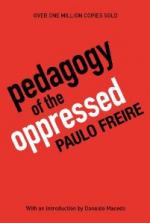
|
| Name: _________________________ | Period: ___________________ |
This test consists of 15 multiple choice questions and 5 short answer questions.
Multiple Choice Questions
1. What is a ‘Generative Theme’?
(a) A type of teaching practice.
(b) A theme that is important to a culture.
(c) A theme that is only important to oneself.
(d) On having many questions at once.
2. What does Friere think is the difference between humans and other animals?
(a) How we get our food.
(b) How we treat each other.
(c) Humans can see outside of their situation.
(d) How we grow up.
3. What is the teacher’s role in the problem-solving education?
(a) The decider of right from wrong.
(b) A judge.
(c) They do not have a role.
(d) A facilitator of a dialogue.
4. What psychological term does Friere use for the teacher-student type of relationship?
(a) A regressive one.
(b) An actualized one.
(c) A psychotic one.
(d) A dysfunctional one.
5. Why, according to Friere, do oppressive regimes maintain untested feasibilities?
(a) To make freedom sensible.
(b) To make freedom a reality.
(c) To make freedom desirable.
(d) To make freedom appear dangerous.
6. What does Friere say the Banking Education needs?
(a) Structors to enforce their will.
(b) Exams and grades to rate each students understanding of 'The' knowledge.
(c) Students.
(d) Tools to punish students.
7. In Friere's system, what is the educator's relationship to the oppressed?
(a) One of solidarity with them.
(b) Familiarity.
(c) Related.
(d) Friendliness.
8. In what sort of society do we find a Limit Situation?
(a) An oppressive one.
(b) An Imperialist one.
(c) A Marxist one.
(d) A free one.
9. What is the duality of the thematic universe?
(a) Left or right.
(b) Good or evil.
(c) Every theme has its opposite acting in conflict at the same time.
(d) Right or wrong.
10. What form does his education then take?
(a) Tailored to each class and individual.
(b) Given to the whole class.
(c) Tailored to each school.
(d) Must be privately funded.
11. How does the educator use Themes and Epochal Units?
(a) He tries to ignore them.
(b) He tells the students when to avoid them.
(c) He tells the students which one is right or wrong.
(d) He recognizes them and encourages students to do the same.
12. How would a teacher teach in Friere's new education system outlined in Part 2?
(a) The teacher would never tell the student the answer.
(b) The teacher would tell the student what to answer.
(c) The student would ask all of the questions.
(d) Both teacher and student would look jointly at a common problem.
13. Why does Friere think that a specific form of education is a contradiction?
(a) It supports the military.
(b) It doesn't teach, it only punishes.
(c) It supports the economy.
(d) It doesn't teach, it just imparts.
14. What future negative aspects does the Banking Education promote, according to Friere?
(a) That a student, worker or citizen only has worth because of their training or job etc.
(b) Banking education teaches prejudice.
(c) Banking education teaches students to be cruel and tough.
(d) Banking education teaches violence.
15. What characterizes an Epochal Unit?
(a) Marxism.
(b) A collection of certain themes.
(c) A lack of themes.
(d) Fossilization.
Short Answer Questions
1. What characterizes an Untested Feasibility?
2. What is 'didactic material?'
3. What issues does Friere believe the educator should be looking at?
4. Which of the following is a form of Limit Act?
5. How are students treated in Banking Education?
|
This section contains 594 words (approx. 2 pages at 300 words per page) |

|




